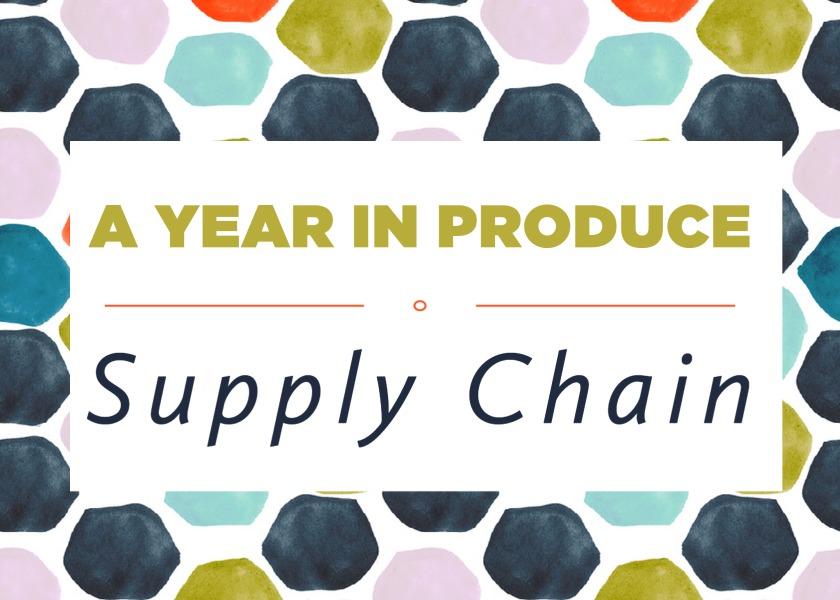2022 Year in Produce: Supply Chain

Supply chain disruptions were endemic when the COVID-19 pandemic began, didn't ease much in 2021 and haven't been totally resolved in 2022.
While port congestion, high truck rates and runaway inflation for farm inputs eased by the end of 2022, supply chain issues were top of mind for many produce buyers and sellers.
In last year's end-of-year coverage, The Packer recounted 2021 troubles with shortages of pallets, packaging, containers for export shipments and trucks.
In November 2021, about two dozen produce industry organizations in Canada and the U.S. issued a joint statement calling for “urgent government action” to address significant ongoing supply chain disruptions.
The group statement outlined several kinds of ongoing supply chain disruptions, each with many complications. The disruptions included crippling port congestion; delays and soaring costs in container shipping; the cascading effects of inconsistent produce delivery; labor shortages across the supply chain; and growing input shortages.
In 2021, the National Grocers Association also sounded the alarm over labor, trucking issues and retail concentration. NGA leaders said 65% of grocery shelf space in America is controlled by five grocery retailers, with those large buyers flexing their power during supply chain crunches to entrench their economic power at the expense of smaller competitors and producers.
At the end of 2022, inflation-battered consumers wilted demand for some consumer goods, easing the tension in the supply chain.
Truck rates for fresh produce shipments have eased considerably in 2022, according to numbers reported by the USDA. The average USDA truck rate for refrigerated shipments began the year at $4.88 per mile in early January. By early December, the refrigerated truck rate for fresh produce was $3.83 per mile, 22% lower than the start of the year.
Survey says big problems still common in food supply chain
Oct. 26
By The Packer Staff
Chicago-based transportation visibility company FourKites and Food Shippers of America released the results of a survey of more than 115 food and beverage industry leaders, showing the three biggest challenges facing the food shipping industry were:
- Labor and talent management (49%)
- Transportation capacity issues (39%)
- Supply and demand planning disruptions (35%)
Shippers indicated in the survey that that COVID-19’s impact on labor (56%), over-the-road capacity constraints (44%), port delays and congestion (30%) and changes in consumer behavior or buying patterns (22%) have all disrupted operations and created or worsened challenges.
Since the pandemic began, more than 30% of respondents reported they have seen a drop in customer loyalty, while 55% have seen a sales decline or miss due to product shortages, according to the release.
About three of four who responded to the survey said they are “concerned” or “very concerned” that rising inflation and geopolitical uncertainty will negatively impact sales during the fourth quarter of 2022, according to the release.
The food supply chain is investing in technology and automation to counter persistent supply chain disruptions, the survey said.
Traceability regulation raise supply chain concerns
Nov. 16
By Kristin Leigh Lore
The FDA's final rule on food traceability was issued in Nov. 15, and the 600-page rule will have an eventual impact on the produce supply chain, industry leaders said.
At the heart of the final rule is the expectation that individuals contacting food will record critical facts associated with key milestones in the food supply chain journey, such as harvesting or cooling. Specifically, the FDA expects persons contacting food on the Food Traceability List to record “key data elements” at “critical tracking events” and provide this information to the FDA within 24 hours or a pre-arranged timeframe.
Foods subject to the final rule requirements were determined based on factors Congress identified in Section 204 of the FDA Food Safety Modernization Act.
“To help ensure the safety of food and its ingredients through all steps in its journey, we must get better at following its movement. It’s just that simple,” Frank Yiannas, FDA deputy commissioner for food policy and response, said in a stakeholder call following the announcement.
This rule will cover domestic production throughout the entire food supply chain, as well as foreign companies producing food for consumption in the U.S.
The Food Traceability List is the FDA’s roundup of specific foods that require additional record-keeping requirements under the FDA’s Food Safety Modernization Act Section 204 and includes the many fresh produce commodities.
According to the FDA’s Katie Vierk, director of the division of public health informatics and analytics, the foods on the list were determined using a risk ranking model that considered factors such as frequency of outbreaks and occurrences of illnesses, as well as criteria such as the likelihood of contamination and potential for pathogen growth.
Key dates in the regulation:
- Jan. 20, 2023: Estimated date that the Final Rule goes into effect, following a 60-day waiting period after publication.
- Jan. 20, 2026: Enforcement date. Compliance and record-keeping requirements go into effect.
“Rule 204 will go a long way toward enabling faster response to recall and outbreak investigations, ultimately protecting public health and fostering consumer confidence,” Alyson Sharron, vice president of marketing at iFoodDS, told The Packer. “While the compliance date of Jan. 20, 2026, is seemingly light-years away, Rule 204 is complex — especially for grocers, foodservice operators, processors and independent distribution centers.”
Rail Strike derailed as Biden signs labor bill
Dec. 5
By Jenna Hoffman
The U.S. food industry avoided major disruption late in the year when a threatened rail strike was derailed in early December by legislation passed by Congress and signed by President Biden. Zippy Duall, Farm Bureau president, said farmers couldn’t afford a rail strike.
"High diesel prices, a truck driver shortage, and low water levels on the Mississippi River have already made shipping conditions difficult," Duvall said in an AFBF press release. "A rail strike would have had a devastating effect on the American economy, especially as families grapple with higher prices caused by inflation."
“There was an industry-wide sigh of relief today after both Congressional chambers voted in favor of implementing the September tentative agreements,” said The Fertilizer Institute's Corey Rosenbusch. “Rail is critical to the movement of fertilizer year-round. Averting embargoes and production delays were crucial to not only ensuring we’re able to provide the fertilizers our nation’s farmers need, but also avoiding additional disruptions to a global market already constrained by geopolitical events and volatile energy prices.”
Still, challenges remain for shippers and receivers.







